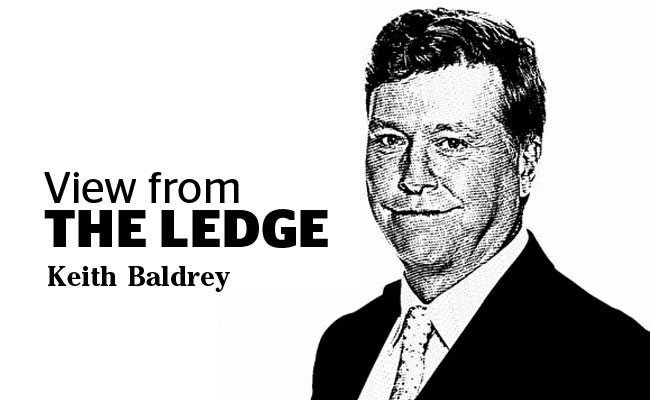One of B.C.’s oldest political footballs is being kicked around again and the kicking is expected to continue for some time.
I’m referring to the Insurance Corporation of British Columbia, which, along with fellow Crown corporation BC Hydro, has proven to be a political playground of sorts for various provincial governments over the years.
Things have now got to the point where some seriously large ICBC rate hikes appear to be inevitable, the result of a government plundering the corporation’s bottom line but also the result of a dramatically changing car insurance industry.
Three rate increase scenarios were released –albeit very reluctantly –by ICBC recently, and the worst-case one of them would see a compounded 42 per cent hike spread over the next five years. The best-case scenario envisions a 16 per cent increase over the same time frame.
Given the huge spike in costs associated with motor vehicle accidents and that there appears little prospect that those costs will decline anytime soon, the worst-case scenario seems much more reflective of reality than the best-case one.
Rick McCandless, a retired assistant deputy minister who now spends his days analyzing ICBC and BC Hydro finances, has been warning for months now that ICBC’s growing habit of using profits from the optional insurance side (almost a half-billion dollars this past year) to keep basic insurance costs from growing at an explosive rate cannot be sustained (and neither can the continued depletion of the Crown’s capital reserves).
The B.C. Liberals now say they will not take a financial “dividend” from the increasingly cash-strapped Crown for at least the next three years. But even that hands-off approach (assuming they stick with that pledge, and assuming an NDP government, if elected, also would not dip its hand in) won’t solve the riddle of rising costs.
Vehicle crashes in B.C. have jumped an astounded 15 per cent in the past two years (distracted driving has likely played a major role in the big increase). Those crashes mean personal injury claims are up (and more expensive on their own; whiplash damages now average more than $22,000, up from an average of less than $5,000 a decade ago) and so are the costs of repairing vehicles.
Improved technology and safety features on motor vehicles have made them much more expensive to repair. For example, in 2005 it cost $620 to repair the windshield of a Toyota Camry. Today, it costs $2,250 (because of a built-in crash avoidance camera) and takes longer to fix.
Another example: a headlight of a Mazda 6 cost $500 to replace in 2005, but today the cost has ballooned a whopping 220 per cent to about $1,600.
Throw in the adverse U.S. dollar exchange rate (most repair parts are sourced in U.S. dollars) and an alarming situation looks even bleaker.
All of these factors meant ICBC’s vehicle damage repair costs skyrocketed by $200 million (17 per cent) in just one year (from 2014 to 2015). Those costs are now approaching $1.5 billion, and are increasing yearly roughly three times the annual rate of inflation.
All these rising costs are borne by ICBC, which simply isn’t raising rates high enough to pay for them.
But while the insurance game is changing, the political game associated with it likely won’t.
Almost since it was created in the 1970s, government decisions dealing with ICBC rates have frequently been based on politics, and not economics.
The NDP governments in 1975 and 1996 both allowed political strategy –based on the election cycle –to determine rate levels.
The B.C. Liberals, since coming to power in 2001, have exerted much more political control over the Crown and have used it as a cash cow which plays a major role in balancing the government’s central budget in various years.
And now, with an election looming, the government is unlikely to admit the fiscal reality to millions of drivers whose votes it will soon be wooing.
But any attempt to confine ICBC’s annual rate hike to a politically expedient, yet economically unsustainable figure is simply putting off the day of reckoning.
Keith Baldrey is chief political reporter for Global BC. [email protected]
What are your thoughts? Send us a letter via email by clicking here or post a comment below.



